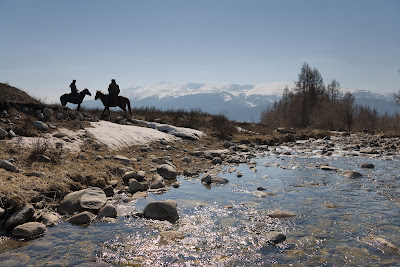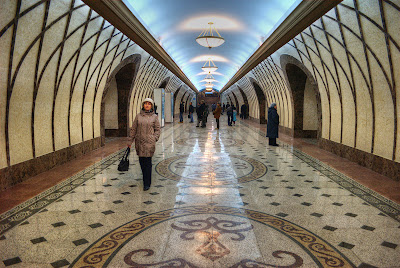There are six independent Turkic nations and four not independent: one in China that is controlled by the Chinese Han, and three in Russia controlled by Russians.
Four of the six independent nations have formed a political organization, the Turkic Council. They are, from left to right in aqua in the map below, Turkey, Azerbaijan, Kazakhstan, and Kyrgyzstan.
The Uighurs, a Turkic people, live in Xinjiang Uyghur Autonomous Region, where they are brutally repressed by the Han. The Republic of Tatarstan,The Tyva Republic, and The Sakha (Yakutia) Republic are nominally autonomous republics in Russia. More on them later.
All are Turkic speakers.
Turks and Azeris can understand each other as easily as Texans and Londoners can.
Inter-intelligibility drops off the further east you go from Turkey, though the Kazakhs and the Kyrgyz understand one another
easily.
Inter-intelligibility drops off the further east you go from Turkey, though the Kazakhs and the Kyrgyz understand one another
easily.
What Turkic people look like (on a swim team).
Distribution of Turkic Languages
From Nomad to Empire to Nation, to Empire Again? I think the four members of the Turkic Council have in mind the recreation of the Ottoman Empire, a Turkic empire that ruled the world for a thousand years.
Turkey has applied for membership in the European Union. The application has been stalled for years, and does not seem likely to happen. Azerbaijan would also like to join the EU. It is at lest as modern and democratic as, er, Greece. Membership does not seem likely.
Turkey is now turning to the East, its traditional base of power.
On October 1, 2010, Turkish Foreign Minister Ahmet Davutoglu said at “International dialogue: accord and tolerance” conference held in Kyrgyzstan: "Turkic states should be as united as the EU." For a dower view, see Sons of the Conquerers, written with verve and intelligence.
Turkey has applied for membership in the European Union. The application has been stalled for years, and does not seem likely to happen. Azerbaijan would also like to join the EU. It is at lest as modern and democratic as, er, Greece. Membership does not seem likely.
Turkey is now turning to the East, its traditional base of power.
On October 1, 2010, Turkish Foreign Minister Ahmet Davutoglu said at “International dialogue: accord and tolerance” conference held in Kyrgyzstan: "Turkic states should be as united as the EU." For a dower view, see Sons of the Conquerers, written with verve and intelligence.
Origins. The Turkic people originated in Altay Mountains in Mongolia.
The top of Belukha in the Altay Mountains
The youth depicted is not Turkic, one supposes
Uighurs on camels in their desert in what is now part of China,
but which once was a Uighur Empire.
Nomadic people are not everywhere treated with kindness.
They rode horses. They loved and love horses.
Horses in Kyrgyzstan
The Turkic nations are, in a way, like Montana -- cold, hot, dry, with folks who love horses. However, the Turkic peoples history dates back 2,800 years, and Montana's 200. Don't know what it is like to have a history stretching 2,800 years.
I suspect it gives one a slant on life that folks in the New World lack.
Kazakhstan, closest to Mongolia and the most nomadic of the Turkic nations, also has architecture that make Honolulu look dowdy:
Interior view
Waiting out a suicide bomb threat,
and the inevitable riot cops, looking like our poster boy (see side bar).
My impression is that Kazakhstan has a democracy sorta like democracy in the United States after Citizens United: the form is carefully preserved, and the election goes to the highest bidder.
This is from Japan. It shows, or is intended to show, how War creates valor. More about that is a later blog post.

























.jpg)






No comments:
Post a Comment